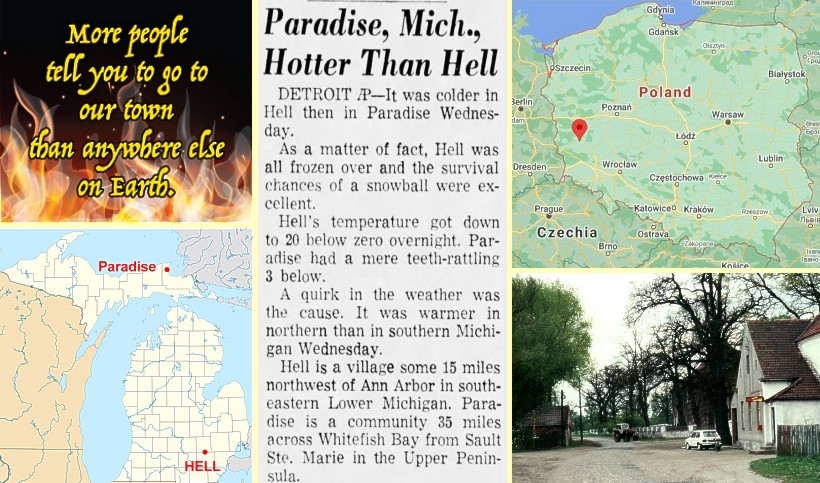Kansas Snapshots by Gloria Freeland - January 7, 2022
Going to hell
I awoke one morning thinking about going to hell. Literally - no, not literally GOING to hell, but the expression.
Like many words or short phrases, it can mean very different things - although I would hazard to say that in this
case, none of them probably refer to anything very uplifting or of a positive nature.
Coming from the mouth of a "fire and brimstone" preacher, those three words almost certainly do refer to the
literal trip to the place where an air conditioner would be handy. And, by the way, what is brimstone? A quick
internet search revealed the following: a 2016 movie - a Western starring Dakota Fanning about a vengeful preacher, a
surface-to-air missile, a cup given as an award in some soccer league, a recreational park in Tennessee, and an archaic word
for sulfur. Certainly this last item must be what fits with "fire and ... ."
However, it could mean a trip to a very different place ... a place I would think to be, on the whole, quite
pleasant. I am referring to Hell, Michigan, where the inhabitants - of which there are few - seem to be encouraging
people to come and visit. It�s an unincorporated area, so it has no definite boundaries and therefore the number
of residents cannot strictly be determined. It's rural and lies about midway between Detroit and Lansing.
Now Detroit has a certain reputation that might suggest Hell is not a great place, but the most widely accepted
story of how it received its name would suggest otherwise. "Hell" is the German word for bright. The Atlas Obscura
at atlasobscura.com, which describes itself as "the definitive guide to the world's hidden wonders," says in the
1830s "a pair of visiting Germans ... described the town as 'so sch�n hell,' (so beautifully bright) ... ."
You might think that the locals ... what there are of them ... would be appalled to have such a moniker, but
you would be wrong here too. They embrace it! The gotohellmi.com website suggests that after a visit, "the next
time someone tells you to 'go to Hell,' you can say you have already been there and had a Hell of a good time."
They invite people to get married there because "A marriage that starts in Hell has no place to go but up!"
You may have thought I had never heard of Hell before and was desperate for column material. And yet again, you'd
be wrong. Husband Art's brother Tommy loved reading the newspaper and clipped small items and placed them in his
billfold to be pulled out at what he considered an opportune moment to enlighten others. They would often have
an "Oh, my God! Here he goes again!" reaction, but it never deterred him.
A favorite was a small item about Michigan, noting that as well as Hell, the state was the only one to also have
a Paradise. It is located in the Upper Peninsula near where the famed freighter Edmund Fitzgerald sank. The news
item noted that on that particular day, Paradise was hotter than Hell!
Leaving Michigan behind, my doctor once described me as "Going to hell before my very eyes!" This was at the onset
of my 1997 illness that left me almost completely paralyzed. It struck Art as being a very bad thing to say to a
patient, but my severe headache had my mind so muddled that his words didn't register. Doug was a great doctor and
as he was nearing retirement, he mentioned it was one of the few times in his career that he felt momentarily
rattled.
While "going to hell" is a moderately common expression here in the States, I was startled when it popped up in
Poland in 1990. We had been visiting various places where Art's mother's relatives had lived. After World War II,
the eastern edge of Germany had been assigned to Poland as compensation for Russia taking a similar area from
eastern Poland. But after the Soviet Union collapsed in 1989, Poland was in a bit of disarray and Westerners were
discouraged from visiting as there was some considerable lawlessness. Our car rental company forbade us to travel
there as they were having trouble with their cars being stolen and then sold back to them. But Art was determined.
His plan involved never leaving the car and never getting into any situation where we would be cornered with no
escape.
We were navigating using German maps from the late 19th century. They had proven to be quite accurate a century
later. Most places were almost deserted, so Art was not concerned when he headed east to get a picture of a
community that was little more than a crossing of two roads. But he soon realized that unlike on the old map, the
road went nowhere. He turned around, intending to skedaddle, only to see a fellow walking from the village
straight for our car.
Friend ... or foe?
Should we make a run for it?
Anxiety!
But as he neared, it was obvious he was not a young man and probably posed little threat. He said something in
Polish, to which Art responded in German that he didn't understand.
"Oh, Deutsch," the man answered.
Art explained we were Americans, tracing family, and a relative had come from there.
The man pointed to where the "Gut" - the communal storage barn - had been located. Then, in passable English, he
said, "It�s all gone to hell. It was better when the Germans were here!"
Hmm. Things were more hell - meaning brighter - before. Perhaps we should raise a glass of hell bier -
a smoother version of an American-style pilsner beer - to going to hell, for it might not be so bad after all!
